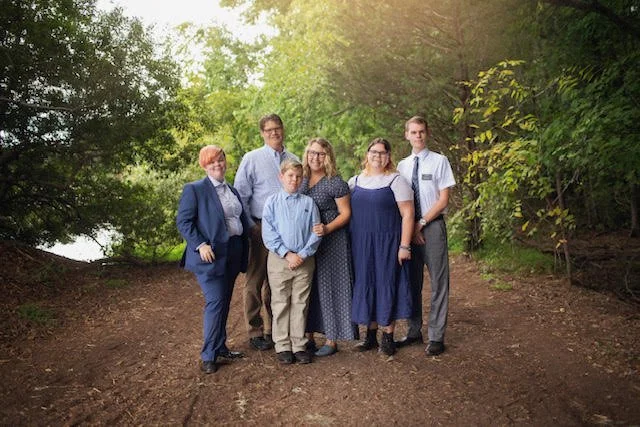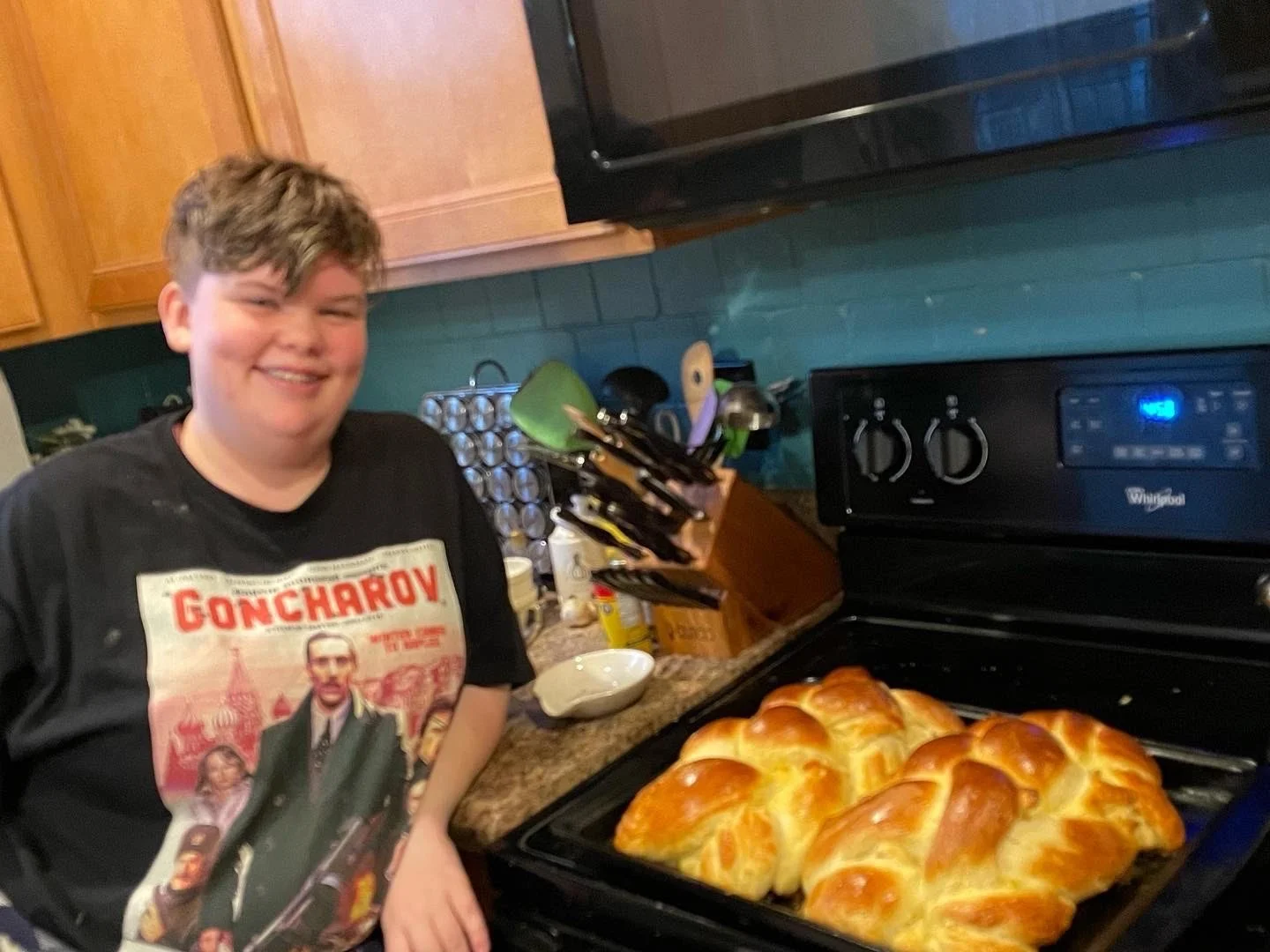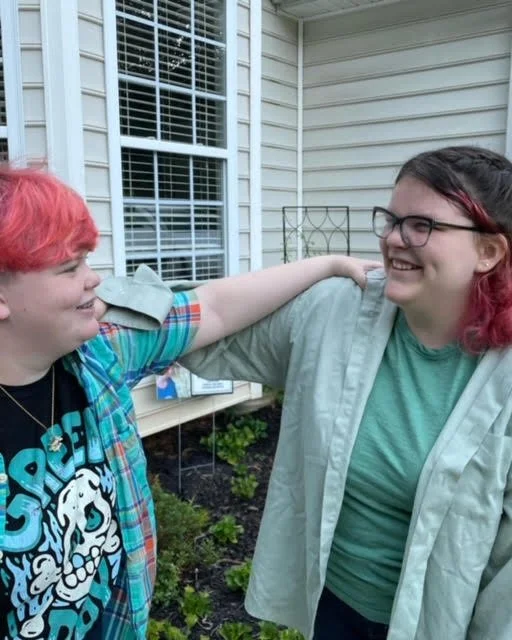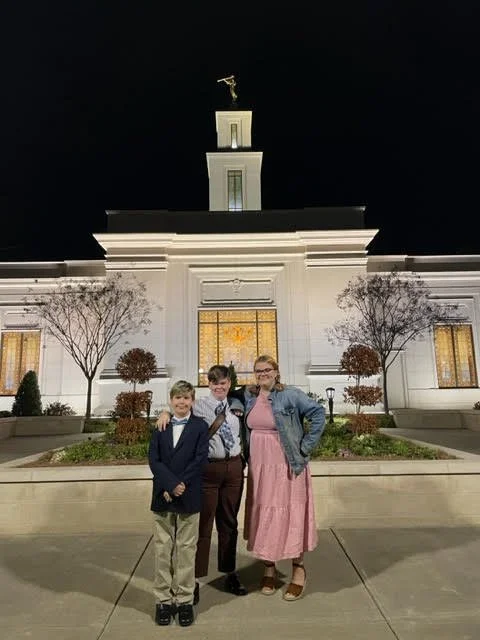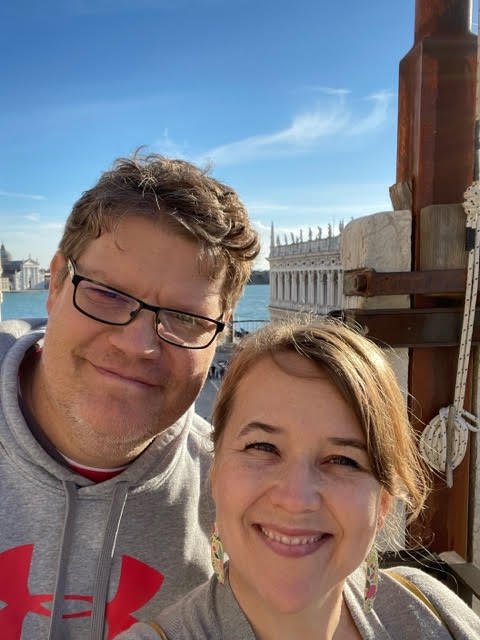Growing up in Idaho, Gwen Priest spent more time at the racetrack with her family than at church. Her parents sometimes took her and sometimes didn’t. They sometimes drank, and sometimes didn’t. Because of this so-called “sinner” status, she felt a tension within her largely-LDS community. Some families wouldn’t let their kids play with Gwen and her siblings. But Gwen always loved the gospel teachings and the sense that when her family life wasn’t stable, the gospel was.
One thing she absolutely learned from her parents was that Christ loves all equally. Her family hosted foster siblings, alcoholics, the homeless and other “lost souls” on their property through her younger years. Her dad had had a rough upbringing himself and taught her, “That’s what we do as Christians. If someone needs something, you help them.”
After moving out on her own, Gwen had a successful IT career in Utah. At 21, she was single, owned two cars and loved her job. People would constantly ask if she was going to serve a mission and she’d think why? I love my life. The older she got, the more she observed church felt like a competition; and eventually, she quit going.
In 2000, she moved to New York City with a friend from Utah and decided to give the Manhattan ward a try. She walked in and saw a man wearing a dress and full make-up. In the chapel, someone pointed out someone who was gay, someone who was trans, and in the corner, a group of BYU interns who looked scared and lost. Observing the diversity in the room, Gwen finally felt, “THIS is my church. This is how it should be, anyone and everyone showing up as who they are. I felt welcome and comfortable. It saved my testimony of the church as an organization.”
Gwen got married, had her first baby, and laughed when her parents said she became a “flaming liberal.” Soon she and her young family moved to North Carolina, where one became four kids. When Gwen’s third child, Maggie, was 10 years old, Gwen found her in her room crying. Maggie had always struggled with anxiety, but this time she could hardly talk when her mom asked her what was wrong. Finally, Maggie said, “Mom, I think I like girls—am I going to hell?” Gwen says, “I had so many feelings and worries, it was like a dam opened. I immediately started praying for the right words, knowing damage can happen in those initial moments. I asked God, ‘What does my daughter need to hear’?” The answer came immediately and Gwen replied, “Of course you’re not going to hell, where did you get that idea?” Maggie shared she had “heard some things” at church. Gwen thought of a few gay friends the family had and said, “What about (this person). Do you think they are going to hell? No? Well neither are you!”
When Gwen left the room and shut the door, her first thought was that her daughter was so young, only 10 years old. She hadn’t even really started puberty yet, how could she know this? But the answer Gwen received to her prayer was, “Just trust her and listen.” Gwen told her daughter she had a lot of changes coming up with her body, friends, and school. She advised Maggie to just take one day at a time and always remember that she had a loving Heavenly Father. She just wanted her daughter to be loved and happy.
Gwen says Maggie’s effervescent, open, and loving personality drove her to want to be honest with a few close friends, even at her young age. Suddenly, Gwen observed Maggie experiencing the same thing she had as a child—other church families pulling away and ostracizing her. Someone in the ward told the Primary president to not let their daughter sit by Maggie. After getting her rage in check, Gwen spoke with the bishop and requested he be prayerful about the Primary teacher they chose for her daughter as she was still dealing with some depression and anxiety. Even with this setback, most of the ward, including the bishop, were kind and quiet about the situation, if not accepting.
Maggie’s coming out to her siblings went well. She was put in charge of a Family Home Evening night where she got up and said, “Well, everyone, I’m gay.” Her older brother and firstborn sibling, Evan—now 19, said, “What?! I’m so confused. How can a member of the church be gay?” As a family, they all talked about what this meant and the fact that Maggie was still young. Gwen told her kids, “You’re still figuring out who you are. Stay close to God, say your prayers, and hopefully we’ll all stay close so we can support each other. We just want you to be happy.”
In 2018, Gwen and the kids’ father divorced, and Gwen decided it was time to live out her dream. She packed up the kids and they set off to backpack through Europe for six weeks. A friend who had LGBTQ kids of her own joined them for part of the trip. Gwen recalls one morning in Toulouse where at 5am she was packing up the car so they could quickly leave for their next stop. While shoving everything in the tiny trunk and looking for George’s missing shoe, Wren approached Gwen and said, “Guess what… I’m gay.” Gwen had no idea how to process this information, which she needed to do on a dime as they had to quickly depart. She looked at Wren and said, “Ok, um, let’s hug. Help me load the car and can we go for a walk as soon as we get to our next stop? I don’t want you to think this isn’t important but… uh….”
Wren (they/them) had been off on their own at a study abroad language immersion program and had just met up with the family. On Wren’s study abroad, they had fallen for another girl in the program. Upon learning this breaking news, oldest brother Evan said, “What is going on? Why are all my siblings gay?”
A year later, Wren approached Gwen and said, “Actually I’ve felt for a long time I’m nonbinary and want to change my name.” Gwen says, “Of all the coming out that’s happened in our family, that was the hardest. As a mom, having raised this child from pregnancy, I didn’t realize how invested I was in their gender. In spite of how open you try to be, you still end up with these subconscious hopes and dreams for your kids. I didn’t even realize they were there until Wren sat me down that day and I had to start adjusting.” Gwen thought, “What does this mean for my baby? That was the hardest for me⎯letting go of my gender expectations for my child. I still have a lot of questions about gender identity, but I love the person Wren is growing into and I’m so proud of their resilience and strength.”
Gwen prioritized core principles throughout her children’s upbringing since they were tiny, including daily scripture study. When Come Follow Me was changed to “Come Follow Me Home” thanks to the pandemic quarantine, Gwen’s family started having tough discussions about how women were treated in the Bible, non-traditional marriage, racism, and how the scriptures talk about women who are divorced. It became a ping pong match between Gwen’s oldest, Evan, who took things seriously and supported the black-and-white policies of the church, and others waving the rainbow flag who made it clear they are loud and proud. “Some of those conversations were very scary. I didn’t want my kids to fight about these issues. I wanted there to be support and love in our home, but through these debates and discussions we made some major breakthroughs in our relationships, learned a lot about the scriptures, tolerance and love, and we are stronger for it.”
In 2021, Gwen, who now works as an author and poet (@leighstatham), married a wonderful man named Blake who had never been married and has no biological children of his own “but took us, and all of this, on without flinching.” Blake became a front-line witness to their very confused, elderly bishop seeing Wren walk into church in a fresh suit for the first time. Gwen says many in their congregation have been very supportive. The temple is the hardest thing for them, because of the gender policies. Wren says, “Basically, because I wear pants to church, I can’t go to the temple.”
When Gwen’s youngest, George, was first able to go to the temple, the whole family—including Blake and Gwen’s ex-husband—decided to go together. Even Wren came and sat in the waiting room. Gwen was touched by the fact that a couple of key people from Wren’s life just happened to be there that day and stopped in to say hi and make them comfortable. Still, this exclusion reminded Gwen of how many of her family members who aren’t in the church couldn’t be in her own temple wedding. “It’s poignant, painful, and makes you stop and wonder why you are doing this when it hurts those you love most. But then you remember, you’re doing it FOR those you love most.”
Wren only comfortably attended combined youth activities and avoided gender divided ones after coming out. One time, they didn’t want to go to an activity and Gwen did something she normally didn’t and nudged Wren out of the car for it. When she returned for pick up, Wren jumped in the car, excited, and told their mom there had been a 12-year-old trans kid present and if Wren hadn’t been there, they would have been all alone. Wren now lives in western North Carolina where they attend college and a family ward. They’re likely the only non-binary LDS member for 150 miles, but Gwen is so proud of how Wren walks a mile in the snow, then carpools with a friend from their university to get to church each week.
Gwen told Wren, “If you’re not there for people to see and meet and get to know, then who will be? It’s hard because everyone usually leaves, but someone has to stay if we want anything to get better.” She continues, “Both of my LGBTQ kids have read the Book of Mormon their whole lives, prayed about it, they love the gospel, they know the scriptures, and they went to seminary. But they rightfully say ‘Where do I fit in?’ I tell them they’re the new generation of pioneers. I say, ‘Think of your ancestors in New England, Britain, Missouri, and Ireland in the 1800’s saying, where does our new faith fit into Christianity? I trust you’re following the path you need to follow. I love you, God loves you, we’ll see what happens. Because we never know.”
Evan’s very strong black and white sense of morality was thrown into an environment at home and at his arts school he couldn't have imagined. But from there, he learned that good friends can grow even if there are major differences of opinion and even within his family. He is currently serving a full-time mission and is applying his experiences to teaching in the field. Evan says, “Loving one another does not mean that you have to agree with every part of life with others. Loving one another means showing respect for others’ decisions or opinions regardless if you agree with them, and voicing concern if necessary.”
Gwen knows and wants her children to know, “Christ is eternal, and he loves us all. In the long run, everything will get worked out–whether you’re active in church or not, living in truth or not, Christ understands us, loves us, and it will be ok, as long as you stay close to Him in the way that is best for you.”
















